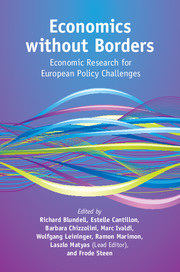Book contents
- Frontmatter
- Contents
- List of Figures
- List of Tables
- Foreword
- Contributors
- Introduction
- 1 Innovation and Growth: The Schumpeterian Perspective
- 2 European Union Dual Labour Markets: Consequences and Potential Reforms
- 3 Population, Migration, Ageing and Health: A Survey
- 4 Education Systems: Assignment, Admissions, Accountability and Autonomy
- 5 Competition and Regulation in Markets for Goods and Services: A Survey with Emphasis on Digital Markets
- 6 Winners and Losers of Globalization: Sixteen Challenges for Measurement and Theory
- 7 Economic Approaches to Energy, Environment and Sustainability
- 8 Regional Disparities and Efficient Transport Policies
- 9 Skilled Cities and Efficient Urban Transport
- 10 Fiscal and Monetary Policies after the Crises
- 11 Financial Regulation in Europe: Foundations and Challenges
- 12 Inequality and Welfare: Is Europe Special?
- 13 Developments in Data for Economic Research
- 14 Big Data in Economics: Evolution or Revolution?
- Index
6 - Winners and Losers of Globalization: Sixteen Challenges for Measurement and Theory
Published online by Cambridge University Press: 24 March 2017
- Frontmatter
- Contents
- List of Figures
- List of Tables
- Foreword
- Contributors
- Introduction
- 1 Innovation and Growth: The Schumpeterian Perspective
- 2 European Union Dual Labour Markets: Consequences and Potential Reforms
- 3 Population, Migration, Ageing and Health: A Survey
- 4 Education Systems: Assignment, Admissions, Accountability and Autonomy
- 5 Competition and Regulation in Markets for Goods and Services: A Survey with Emphasis on Digital Markets
- 6 Winners and Losers of Globalization: Sixteen Challenges for Measurement and Theory
- 7 Economic Approaches to Energy, Environment and Sustainability
- 8 Regional Disparities and Efficient Transport Policies
- 9 Skilled Cities and Efficient Urban Transport
- 10 Fiscal and Monetary Policies after the Crises
- 11 Financial Regulation in Europe: Foundations and Challenges
- 12 Inequality and Welfare: Is Europe Special?
- 13 Developments in Data for Economic Research
- 14 Big Data in Economics: Evolution or Revolution?
- Index
Summary
Abstract
The goal of this chapter is to summarize the state of the art in research in international trade and global production, and discuss issues relevant to European policymakers. Much of recent research on globalization is primarily empirical, owing to the proliferation of available data. We begin by discussing recent advances in measuring the causes and effects of globalization, and discussing the particular data challenges that have emerged. We then turn to theories of trade and global production, first summarizing the conclusions on which there is a broad consensus in the field. We discuss new insights that may be relevant for policy-makers, and open research questions.
Introduction
The fortune of workers, consumers and firms increasingly depends on other countries. This global interdependence is driven by the flow of goods, capital, ideas and people across countries. This chapter summarizes research about two aspects of globalization: international trade in goods and services, and the international fragmentation of production. We first summarize the overarching themes that are common to both topics. We conclude with a set of open questions, and propose an agenda for better connecting academic research with the needs of policy-making. We also discuss data challenges facing economists and policy-makers alike.
The primary motivation of theories of globalization is to explain how international interactions differ from domestic interactions, and why they occur in the first place. Why do countries trade goods with one another? Why do some companies locate part of their production abroad? Canonical models of trade and globalization explain the magnitude and patterns of cross-country movements, and their welfare implications. An almost tautological conclusion of these models is that if countries choose to interact with one another, they must be better off than being in isolation. Models may differ in the magnitude of the gains from trade they predict, but these gains are almost uniformly positive.
A central theme is that globalization benefits some more than others. In fact, some may even become worse off as their country becomes more open to the flow of goods, ideas, and people. For example, workers in import-competing industries stand to lose when countries open up to trade. These distributional effects of globalization are widely studied both theoretically and empirically.
- Type
- Chapter
- Information
- Economics without BordersEconomic Research for European Policy Challenges, pp. 238 - 273Publisher: Cambridge University PressPrint publication year: 2017
- Creative Commons
- This content is Open Access and distributed under the terms of the Creative Commons Attribution licence CC-BY-NC-ND 4.0 https://creativecommons.org/cclicenses/
- 3
- Cited by



